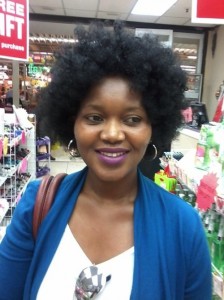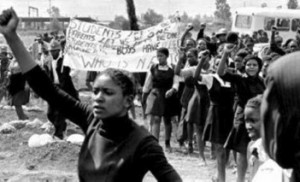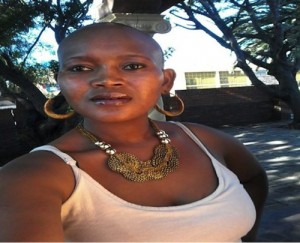In the Weekly Dissident today, MPHUTLANE WA BOFELO talks to Yolisa Mazonda about race and class, activism and anarchy.
MwB: Who is Yolisa Mazonda and what is her philosophy of life?
YM: Yolisa Mazonda is a young African woman who was born in the 80’s, in Port Elizabeth, New Brighton during a time of political unrest. There were organised strikes every week and day by activists. Amabutho ran the streets. By the late eighties I could feel the tensions around me: people were being necklaced, and there was a raging promise of something big that was to happen, a good war for freedom. Ah! that word was used on the daily by my neighbors and family: “Freedom!â€
As a young girl who was still seven to nine years old, nothing made much sense, but I knew that this freedom old folks were talking about is something magical. I think that is what has shaped my philosophy of life, my world-view and ontological vocation with the obsession of justice, for freedom. I believe in social justice and freedom for the oppressed African people.
MwB: Your Facebook name is Black Rage. What does Black Rage represents and how is Black Rage related to Yolisa? How does Yoliswa express the black rage, and how does Black Rage represent Yolisa?
YM: Black rage is a response to the systemic violence of poverty. For 500 years we have been singing that freedom song. We are tired of being tired. The previous generation before us has systems in place to trap us into an ideology of silence, education, entertainment, and other tools are used on us to recruit us into following the pervasive logic of capitalism. We are being recruited to conform to the status quo that oppresses us. We still get inferior education and healthcare. We are landless, used as cheap labour for big corporate companies, or at retailers, factories and in the mines that are majority owned by foreign capital under the administration of a government which tells us that we are free. By doing this, we have been normalized to accept this as our reality and freedom.
Black Rage is a black woman with critical consciousness who is more than angry at these conditions. I’m mad as hell, and I believe that it will take that black rage for us to wake from the slumber and lull of oppression under a comprador bourgeois government and act. Black Rage is Yolisa; she is every black girl that is a victim of social violence, patriarchy, white supremacy and capitalism.
MwB: Your research interests are urban studies, urban history, international relations, gender studies, and critical rheory; and you have been involved in both the Blackwash and September National Imbizo (SNI) in which there was\is regular reference to concepts such as anarchism, black anarchism, radical black consciousness and in which the notion of entering politics to end politics was used. Please share your own take of these concepts, particularly the whole notion of whether radicals should only use underground and alternative spaces, and eschew any relationship with mainstream and established spaces or whether one can use both.

Coming from a black household of so called middle class parents which had sought to integrate into the new South Africa by taking advantage of the “benefits” Apartheid had deprived them, such as giving your children an opportunity to attend “better” schools as opposed to the inferior bantu ones, our generation entered these schools which were actually tools that are designed to prepare us for the capitalist world that the new South Africa under the ANC had inherited from apartheid.
Some of us found it hard to find political expression in a set-up of partisan politics. We knew that we experienced racism multiplied in the Rainbow Nation and we were confronted with it daily in our schools. Of course we could never complain at home. Blackwash and SNI gave us that space to express and articulate our black humiliation, racism, oppression through the teachings of Steve Biko, Frantz Fanon, Amilcar Cabral and so many revolutionary literatures.
MwB: What are your own views on the dangers, challenges, strengths and weakness in these approaches? How do you locate them in the Pan Africanist and Black Feminist perspectives within which you also operate?Â
YM: The danger around these politics is that many comrades tend to get stuck in the race question and negate the class question. This has caused so much frustration; a lot of people are just individualists and aspirant bourgeosie who just want to change the colour of capitalists/oppressors and are not really interested in changing the status quo.
Social movements also have a danger of being sectarian and infantile, the challenge around cultism and dogma, intellectualism, verbalism are some of the weaknesses that these Black Consciousness/Pan Africanist spaces have. The message that the revolutionary theory holds gets lost to the illiterate pauperized African. The strength of these approaches is that it has a clear ideology and I believe that without a coherent ideology, we will get lost in the murky waters of liberalism. All struggles are interlinked, the mother of them all being the class struggle. It is liberal to speak about patriarchy as an isolated struggle to the race, white supremacy, capitalism and others oppressive forces. For me, Black Feminism, Pan Africanism and Black Consciousness are just branches of discipline in the fight against white supremacy and capitalism.
MwB: If you were to write a manual for the rebels and radicals, what would it contain?
YM: My manual would include work with communities. The only way we can be able to achieve critical consciousness and inspire our people to have a sense of agency is by working side by side with them. I cited sectarian politics as being a challenge, weakness or to be fair a trap for the conscious rebel. Comrades sometimes isolate themselves in idealism. They read history without question and imagine a new social order that is perfect or heavenly; they get stuck in this idealism and end up detaching themselves from the rest of the whitewashed masses.
Now in reality, if you move from the premise of understanding that this white supremacy and capitalist discourse was designed by man to oppress and exploit us, surely the solution to this would be to construct a new socialist discourse for an Africanist Socialist Revolution. That is why activism is the most important act, we must be in touch with our communities, our conditions dictate this, we can’t argue about the education system, food and health without engaging our communities and teaching ourselves about the available socialist alternatives. We all know that public schools offer inferior education where illiteracy levels are shocking; I think we can be effective in this regard by teaching learners reading skills through revolutionary theory off course.
My manual would construct a step by step on how activism could be re-introduced in our communities A construction of a new socialist society, with alternatives to capitalism, how to grow our own food for ourselves instead of depending on retail grocer which is part of a big corporate conglomerate. The land question would definitely be urgent for us and could possibly move us to confront the government about addressing it. Our key focus would be geared towards addressing our socio-economic needs through action.
I am currently working with a community-based organisation called Unako which is based at Nelson Mandela Metro University. Our approach could be described as anarchist. We work with learners at schools and we have programs such as literacy and public speaking. We have arts an arts wing and an annual spelling bee competition for learners. We do not operate or work in the formal way; we work with learners through discussing with them. We are looking forward to growing and implementing new programs.

![Yolisa Mazonda 2 [resized]](https://www.thedailyvox.co.za/wp-content/uploads/2014/09/Yolisa-Mazonda-2-resized.jpg)









